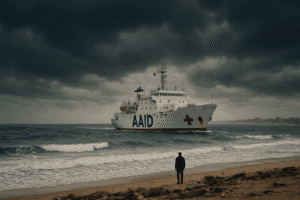Beyond the Storm: The Perilous Journey of Aid and Activism to Gaza’s Shore
A humanitarian flotilla carrying activists including Greta Thunberg turned back due to stormy weather, a temporary setback in a mission facing far greater political obstacles. The group aims to break the Israeli naval blockade to deliver urgently needed aid to Gaza, where famine and a severe humanitarian crisis are worsening. This effort highlights the desperate failure of conventional aid channels to address the immense suffering. Despite the delay, the voyage serves as a powerful symbolic act of solidarity, drawing global attention to the plight of civilians.
The mission underscores the stark contrast between navigable natural storms and the impenetrable man-made barriers preventing aid. Ultimately, the flotilla’s struggle emphasizes that the delivery of basic survival supplies should not require such perilous civilian-led defiance.

Beyond the Storm: The Perilous Journey of Aid and Activism to Gaza’s Shore
A determined humanitarian mission, carrying a cargo of hope and high-profile activists like Greta Thunberg, has been forced to yield to a more immediate force: nature itself. The Global Sumud Flotilla, which set sail from Barcelona for the Gaza Strip, has turned back to port due to stormy weather, a temporary setback in a voyage fraught with far greater, human-made obstacles.
This isn’t merely a story about a delayed boat trip. It’s a microcosm of the larger, desperate struggle to get aid into Gaza, where the elements of politics and conflict have proven far more formidable than any Mediterranean storm.
A Mission Defined by “Sumud”
The flotilla’s name, “Sumud,” is an Arabic word meaning “steadfastness” or “perseverance.” It’s a term deeply rooted in the Palestinian experience, representing a form of non-violent resistance against overwhelming odds. This ethos defines the mission. The organizers aren’t just attempting to deliver food, water, and medicine; they are trying to physically break the Israeli blockade and draw global attention to what they and numerous aid agencies call a catastrophic humanitarian crisis.
The passengers—a mix of activists, former politicians like Barcelona’s ex-mayor Ada Colau, journalists, and figures like Thunberg and “Game of Thrones” actor Liam Cunningham—are there to lend their visibility to the cause. As Thunberg stated in Barcelona, “The story here is how people are being deliberately deprived of the very basic means to survive.”
The Human Crisis Beyond the Headlines
The flotilla’s cargo is not abstract. It is intended for a population where, according to food experts, famine has taken hold in Gaza City. The statistics are staggering: over 63,000 killed in the nearly 23-month war, with at least 332 Palestinians, including 124 children, dying specifically from malnutrition.
But it was Cunningham who cut through the numbers with a devastating human story. He shared a video of a young girl named Fatima, singing as she planned her own funeral. She died four days ago. “What sort of world have we slid into where children are making their own funeral arrangements?” he asked reporters. This poignant moment underscores the grim reality that makes missions like the flotilla feel urgently necessary to its participants.
The Real Storm is Political
The Mediterranean weather is a temporary hurdle. The enduring challenge is the Israeli naval blockade and the ongoing military offensive. Israel states the blockade is necessary to prevent weapons from reaching Hamas, the group whose October 7, 2023, attack killed 1,200 people in Israel and initiated the current war. An Israeli official has already stated the country plans to slow or halt aid into parts of northern Gaza as it expands its operation there.
This flotilla is well aware of the precedent. In June, Thunberg was deported when her previous aid vessel was intercepted by the Israeli military. In late July, another ship had its cargo of baby formula and medicine seized, and its 21 activists detained. The central legal and ethical conflict—fiercely debated on the international stage—is whether a blockade can lawfully restrict essential humanitarian supplies to the point of famine.
The Value of the Voyage, Even in Setback
While the flotilla’s concrete goal is to deliver aid, its broader value may lie in its symbolic power. By turning back due to weather, not yet by force, the mission has created a pause—a moment to reflect on the stark contrast between a navigable storm at sea and the impenetrable political storm on shore.
It forces a difficult question: if a group of international citizens can organize a maritime convoy to confront a naval blockade for the sake of delivering baby formula, what does that say about the established mechanisms for providing aid?
The organizers say they will try again when the weather clears. Their journey, whether ultimately successful in reaching Gaza or not, serves as a stark, floating protest and a tangible effort to confront a human-made disaster. It highlights a profound failure of traditional diplomacy and aid corridors, reminding the world that for hundreds of thousands facing starvation, the most basic means of survival should not have to arrive on a boat braving both storms and conflict zones.
You must be logged in to post a comment.